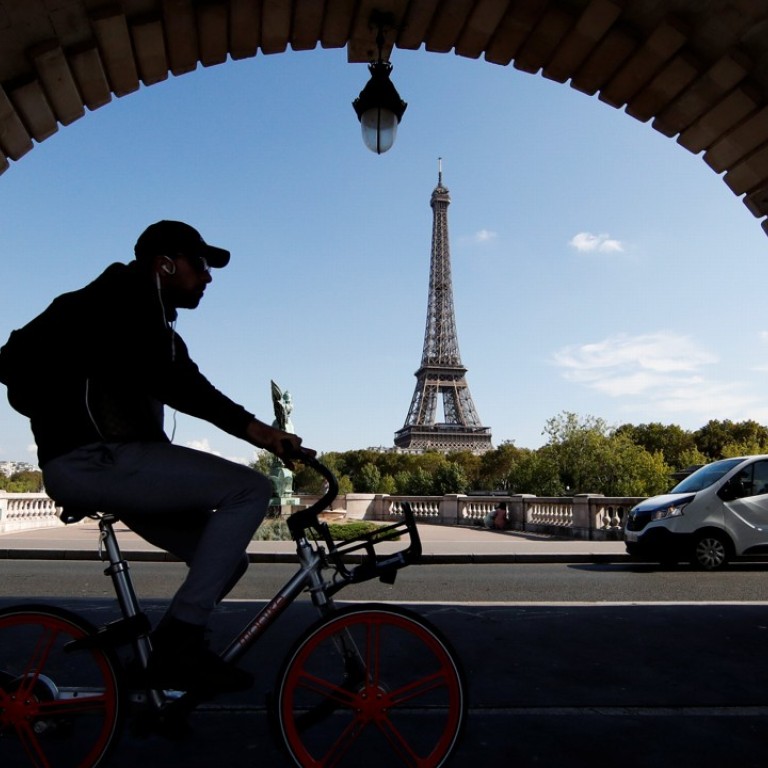
Exclusive | Uber pedals into Europe’s bike-sharing market, as Ofo and Mobike pull out after vandalism issues
The move forms part of the US ride-hailing giant’s strategy to establish a super app for all of its users’ urban transport needs
Issues of vandalism and theft have recently forced Chinese bike-sharing pioneers Ofo and Mobike to abandon a number of cities in Europe, despite growing demand.
But these troubles have not deterred US ride-hailing giant Uber Technologies, which is preparing to launch its own bike-sharing operations across Europe in the fourth quarter.
San Francisco-based Uber, which acquired US bicycle-rental service Jump Bikes in April, plans to introduce its bike-sharing service in Berlin before launching in other major cities in the continent, according to Uber vice-president Rachel Holt, head of the firm’s New Mobility unit.
The company plans to eventually compete globally, Holt said in an interview in Hong Kong last Friday. “What I can say is that we are very much interested in exploring opportunities in the Asia-Pacific region,” she said.
China, however, will not be part of the immediate plans, she said. Uber sold its Chinese ride-hailing business to rival Didi Chuxing in 2016, which ended a fierce two-year battle that saw both companies pour billions of dollars into fare subsidies to compete for both drivers and passengers.
Bike-sharing in China also remains highly competitive. Mobike, Ofo and Hellobike dominate in the world’s most populous country, where there was once more than 40 bike-sharing services providers. Uber’s move into the bike-sharing industry comes as the company plots a course to turn itself into a platform that can cover every user’s urban transport requirements.
Dara Khosrowshahi, who took over as chief executive at Uber in August 2017, earlier announced the company’s vision to become a “multimodal transport platform”, which integrates ride-hailing, bike-sharing, scooter-sharing, food delivery, flying taxis, public transit and other services into a single app.
That super app initiative emulates the advances made by China’s major internet companies to build platforms that can host multiple services, delivering greater convenience to consumers amid huge adoption of smartphones in the world’s second largest economy.
“With regulatory pressure from the taxi industry and authorities in some jurisdictions, this diversification makes sense,” said Valerie Law, an analyst on Singapore-based investment research network Smartkarma. “With multimodal forms of transport, Uber can venture into fleet management services for businesses and do last-mile delivery of food or services.”
Jump Bikes has so far been available in four US cities, including San Francisco and Washington with more than 500,000 riders, according to Uber.
The US company’s foray into Europe’s bike-sharing market will put it in head-to-head competition with Ofo, which is backed by e-commerce giant Alibaba Group Holding, and Mobike, which is controlled by Hong Kong-listed on-demand services provider Meituan Dianping. Alibaba is the parent company of the South China Morning Post.
Uber, which has existing ride-hailing operations in the continent, is looking to fill the gap left by bike-sharing operators who have pulled out in some cities, according to Smartkarma analyst Henry Soediarko.
Hong Kong start-up Gobee.bike was the first Asian bike-sharing operator to retreat from Europe in February, plagued by theft and vandalism. Mobike suspended its service in Manchester in Britain, which was the first European city it entered, in early September for the same issues. In July, Ofo shut down its services in Norwich, Sheffield and Leeds in Britain.
City administrators in Britain had also threatened to charge Ofo and Mobike a fee for “commercial use of public space” because their dockless bikes have been parked haphazardly by users, blocking public thoroughfares.
Uber could face similar issues.
“Without a clear regulation on lock mechanisms and collaboration with the regional government, Uber’s bike-sharing venture in Europe may end up like those of Mobike and Ofo,” Smartkarma’s Soediarko said.
Uber, which is expected to go public in 2019, posted a net loss for the second quarter this year of US$891 million, down from US$1.1 billion in the same period last year. It reported a profit of US$2.5 billion in the first quarter – technically – due to accounting gains from the sale of its Southeast Asian business to Grab and its Russian business to Yandex.
“Going forward, we’re deliberately investing in the future of our platform: big bets like Uber Eats; congestion and environmentally friendly modes of transport like Express Pool, e-bikes and scooters; emerging businesses like freight; and high-potential markets in the Middle East and India, where we are cementing our leadership position,” Khosrowshahi said in a statement in August.

